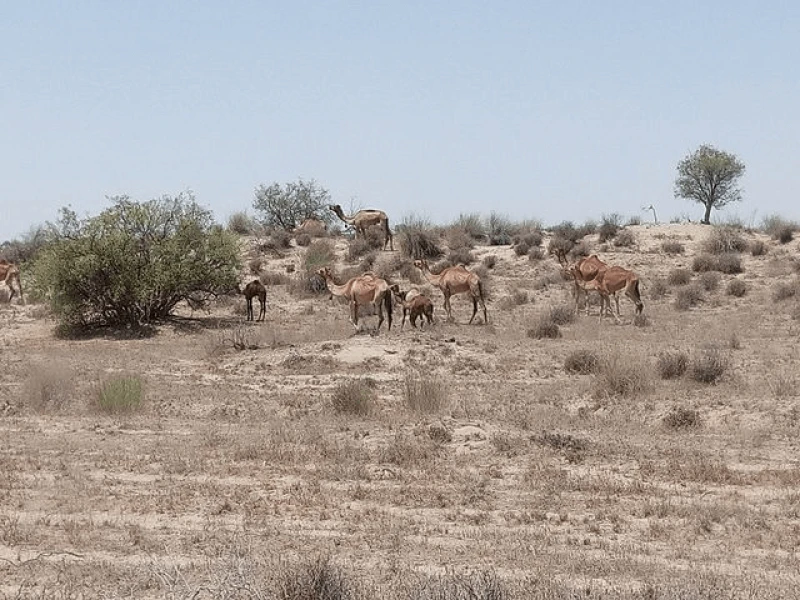Traits found in roots of desert plants could help crops survive escalating droughts due to climate change
Traits found in roots of desert plants could help crops survive escalating droughts due to climate change


“Mitigating the effects of drought on crop plants is an urgent goal for those of us working in agricultural biotechnology,” says Heribert Hirt from KAUST, who worked on the project with colleagues from Germany and across Saudi Arabia, including Khairiah Alwutayd, an assistant professor from Princess Nourah bint Abdulrahman University.
“The DARWIN21 desert initiative was launched 10 years ago at KAUST to isolate and analyze desert microbes. Our hope is that they can convey the same traits to crop plants as they do to desert plants, making them heat, salt and/or drought tolerant,” says Hirt. “This could contribute greatly to global food security.”
As part of the DARWIN21 program, Hirt and his team have already isolated more than 10,000 desert microbial strains from desert soils and the roots of desert plants. They have screened hundreds of these strains, germinating Arabidopsis plants with each different strain, searching for those that significantly enhance the plant’s tolerance to drought.
For this particular study, which aimed to explore the molecular mechanisms behind enhanced drought resilience, they selected a bacterium strain from Pseudomonas argentinensis called SA190. SA190 originates from the root nodules of Indigofera argentea, a small shrub-like plant found in deserts and dry shrublands from the Sahara to India.
“Because we know so much about Arabidopsis — it is the genetic model in plant biology — we could analyze the precise molecular mechanisms and changes that SA190 triggered in the plant in response to drought,” says Alwutayd.
The team found that SA190 modifies the epigenetic status of important drought stress genes. These genes are not expressed under good growing conditions, but are exclusively expressed when plants are exposed to drought.
“SA190 boosted these genes only when needed, meaning that crop yields were not affected, which can be an unfortunate side effect of some drought mitigation efforts,” notes Alwutayd. “SA190 actively changed the plant root architecture and thereby enhanced the plant’s water use efficiency.”
The team then primed alfalfa with SA190, and these plants showed significantly enhanced drought resilience compared with controls.
“SA190 can easily be produced in large quantities in fermenters and the seeds of crops only need to be coated with the microbes,” says Hirt. “Once the seeds are disseminated onto the field, SA190 associates directly with the crop seedlings, thereby avoiding competition with other soil microorganisms. This is potentially a very powerful tool for helping plants resist drought.”

 | Videos | More... |

Video: Nuclear energy will destroy us? Global warming is an existential threat? Chemicals are massacring bees? Donate to the Green Industrial Complex!
 | Bees & Pollinators | More... |

GLP podcast: Science journalism is a mess. Here’s how to fix it

Mosquito massacre: Can we safely tackle malaria with a CRISPR gene drive?

Are we facing an ‘Insect Apocalypse’ caused by ‘intensive, industrial’ farming and agricultural chemicals? The media say yes; Science says ‘no’
 | Infographics | More... |

Infographic: Global regulatory and health research agencies on whether glyphosate causes cancer
 | GMO FAQs | More... |

Why is there controversy over GMO foods but not GMO drugs?

How are GMOs labeled around the world?

How does genetic engineering differ from conventional breeding?
 | GLP Profiles | More... |

Alex Jones: Right-wing conspiracy theorist stokes fear of GMOs, pesticides to sell ‘health supplements’




 Viewpoint — Fact checking MAHA mythmakers: How wellness influencers and RFK, Jr. undermine American science and health
Viewpoint — Fact checking MAHA mythmakers: How wellness influencers and RFK, Jr. undermine American science and health Viewpoint: Video — Big Solar is gobbling up productive agricultural land and hurting farmers yet providing little energy or sustainabilty gains
Viewpoint: Video — Big Solar is gobbling up productive agricultural land and hurting farmers yet providing little energy or sustainabilty gains Fighting deforestation with CO2: Biotechnology breakthrough creates sustainable palm oil alternative for cosmetics
Fighting deforestation with CO2: Biotechnology breakthrough creates sustainable palm oil alternative for cosmetics Trust issues: What happens when therapists use ChatGPT?
Trust issues: What happens when therapists use ChatGPT? California, Washington, Oregon forge immunization alliance to safeguard vaccine access against federal undermining
California, Washington, Oregon forge immunization alliance to safeguard vaccine access against federal undermining 30-year-old tomato line shows genetic resistance to devastating virus
30-year-old tomato line shows genetic resistance to devastating virus The free-range chicken dilemma: Better for birds, but with substantial costs
The free-range chicken dilemma: Better for birds, but with substantial costs ‘You have to treat the brain first’: Rethinking chronic pain with Sanjay Gupta
‘You have to treat the brain first’: Rethinking chronic pain with Sanjay Gupta
